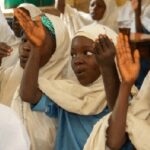See the Numbers of Out-of-School Children in Borno, Yobe, and Adamawa – UNICEF
See the Numbers of Out-of-School Children in Borno, Yobe, and Adamawa – UNICEF

Out of school children
The United Nations Children’s Fund (UNICEF) has called on key stakeholders to increase funding for education in Borno, Adamawa, and Yobe States, labeling the situation an educational emergency crisis.
UNICEF estimates that nearly 2 million children are out of school across these three states. Gilmar Teddy Zambrana Cruz, UNICEF Education Manager and Officer-in-Charge, Chief of the Borno Field Office, highlighted this issue during a two-day event titled “UNICEF GPE-AF Project on Education and Learning for Children in Emergencies in North-East Nigeria,” held in Maiduguri.
Cruz emphasized the importance of prioritizing education and urged the governments of the affected states to ensure children have access to safe and secure learning environments. “We estimate around two million out-of-school children, especially in Borno, Adamawa, and Yobe States,” he stated.
UNICEF is collaborating with state governments and ministries to tackle these challenges, implementing programs to help children return to school and address learning delays. Cruz expressed hope that this program would transform the educational conditions for children, noting past successes where education conditions improved for 180,000 children in the BAY (Borno, Yobe, and Adamawa) States.
Bulama Kagu, Professor and Chairman of the Borno State Universal Basic Education Board, acknowledged the challenges related to out-of-school children. He noted that some local government areas, such as Abadam, Guzamala, and Kala-Balge, still face security issues due to Boko Haram insurgency. However, he expressed optimism that once these areas are liberated and resettled, significant changes will occur.
Umaru Garba Tella, Commissioner for Education and Human Capital in Adamawa State, described the out-of-school children crisis as a national burden. He urged regional governors to address it with utmost importance. “No nation will progress with a high rate of this menace. The best place for a child is the classroom. If we don’t implement deliberate policies and actions to remove these children from the streets, our society’s productivity will suffer,” Tella warned.
UNICEF’s project, funded by the Global Partnership for Education-Accelerated Fund (GPE-AF), aims to build on the successes of the previous GPE-AF project, which ran from 2020-2023 in 24 LGAs across the BAY States. The previous project improved access to formal and non-formal education, learning outcomes, and continuity of learning for over 180,000 conflict-affe
cted children.
TRENDING SONGS
 NPMA Appeals to Nigerian Government for Compensation After Lagos Market Fire
NPMA Appeals to Nigerian Government for Compensation After Lagos Market Fire
 Rest Every Four Hours, FRSC Issues Safety Guide for Fasting Motorists
Rest Every Four Hours, FRSC Issues Safety Guide for Fasting Motorists
 NNPC Boss Ojulari Bags UK Energy Institute Fellowship
NNPC Boss Ojulari Bags UK Energy Institute Fellowship
 Shock in Anambra: Bride Disappears Moments Before Wedding
Shock in Anambra: Bride Disappears Moments Before Wedding
 Nigerian Woman Returns ₦330 Million Accidentally Credited to Her Account
Nigerian Woman Returns ₦330 Million Accidentally Credited to Her Account
 APC Don Reach Morocco?’ VeryDarkMan Reacts to Seyi Tinubu Poster
APC Don Reach Morocco?’ VeryDarkMan Reacts to Seyi Tinubu Poster
 Bride Breaks Down in Tears as Wedding Meals Were Kept Secretly While Guests Go Home Hungry
Bride Breaks Down in Tears as Wedding Meals Were Kept Secretly While Guests Go Home Hungry
 Odogwu by Day, Robber by Night: How Marriage Joy Turned Into Tragedy
Odogwu by Day, Robber by Night: How Marriage Joy Turned Into Tragedy
 Nigerian Officials Allegedly Pocket N4–6B Weekly Through Smuggling Cartels at Seme–Badagry Border
Nigerian Officials Allegedly Pocket N4–6B Weekly Through Smuggling Cartels at Seme–Badagry Border
 Ahmad Yerima: Naval Officer to Face No Sanctions After Clash with Wike – Matawalle
Ahmad Yerima: Naval Officer to Face No Sanctions After Clash with Wike – Matawalle
Share this post with your friends on ![]()













